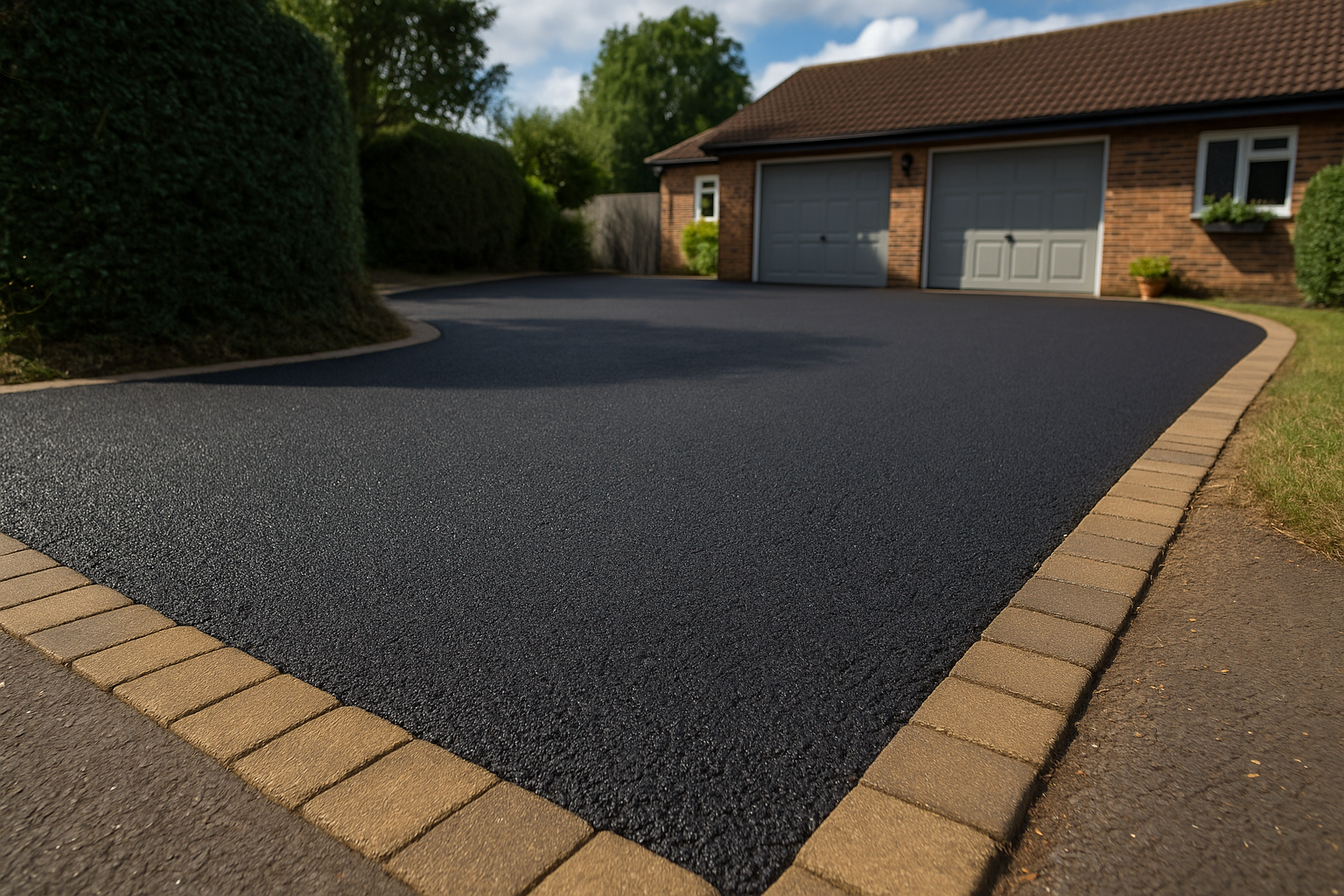Oct
Tarmacing Explained: Cost, Drying Times, Moss Removal & More
- 2025
- admin
What Is Tarmac and How Is It Made?
Tarmac, short for tarmacadam, is a surfacing material made by binding crushed stone with bitumen (a by-product of petroleum refining). It was popularised in the early 20th century after being developed from techniques by Scottish engineer John Loudon McAdam.
Today, tarmac is widely used for driveways, private roads, car parks, and paths due to its affordability, durability, and quick installation time. It’s a popular choice for both domestic and commercial surfaces.
Is Tarmac Permeable?
Tarmac is not naturally permeable, which means water doesn’t pass through it. This is an important factor when considering planning permission for new driveways.
In many parts of the UK, new driveways over 5m² must have adequate drainage to prevent water runoff into public roads. However, drainage systems such as soakaways, gullies, or permeable base layers can be added during installation to meet these requirements.
For projects needing compliance with SUDS (Sustainable Urban Drainage Systems), alternative surfaces like resin-bound surfacing may be recommended.
Tarmac vs Asphalt: What’s the Difference?
While often used interchangeably, tarmac and asphalt are not the same:
| Feature | Tarmac | Asphalt |
|---|---|---|
| Binder | Bitumen + aggregate | Bitumen + sand & aggregate |
| Texture | Slightly rougher | Smoother finish |
| Common Uses | Driveways, private roads | Highways, motorways |
| Durability | Good for domestic use | Excellent for heavy traffic |
In short, tarmac is more cost-effective for residential driveways, while asphalt is designed for high-load, high-traffic areas like roads and car parks.
tarmacing services.
How Much Does It Cost to Tarmac a Driveway?
The cost to tarmac a driveway varies depending on:
- Size of the area
- Ground preparation required
- Location/access
- Waste removal
- Drainage requirements
Average UK Tarmacing Costs:
- Per square metre: £45–£70+ (incl. labour & materials)
- Per tonne (supply only): £100–£130
- Typical driveway (50m²): £2,500–£3,500
Tarmac remains one of the most cost-effective surfacing solutions available. It’s quicker to lay and less expensive than options like block paving or resin.
How Long Does Tarmac Take to Dry and Set?
After installation, tarmac dries within 24–48 hours depending on weather and temperature. However, it can take up to 28 days to fully cure and harden.
Usage Timeline:
- Walkable: After 12–24 hours
- Driveable: After 48 hours
- Fully cured: 2–4 weeks
Avoid parking heavy vehicles on your new tarmac during the first week, and try to prevent tight turning which could cause scuffing.
How to Remove Moss from Tarmac
Moss, algae, and lichen can grow on tarmac surfaces, especially in shaded or damp areas. Not only is it unsightly, but it can also make the surface slippery.
Prevention Tips:
- Ensure good drainage
- Trim overhanging trees/bushes
- Use a driveway sealant for added protection
Removal Methods:
- Pressure washing (with care to avoid damage)
- Moss killer spray (biodegradable and pet-safe options available)
- Manual scrubbing with a stiff brush and diluted bleach or vinegar
For stubborn infestations, professional cleaning may be the most effective solution.
What Is Tarmac Made Of?
Tarmac is made from:
- Bitumen: a viscous liquid from crude oil
- Aggregate: crushed stones of varying sizes
These components are heated, mixed, and applied hot. Once spread and compacted, the material sets into a hard, weatherproof surface.
Who Invented Tarmac?
While John McAdam is credited with inventing the road-building method known as “macadam,” modern tarmac was patented in 1902 by Edgar Purnell Hooley. He added tar to the macadam mix, creating a more durable and dust-free surface — and tarmacadam (tarmac) was born.
Should You Choose Tarmac for Your Driveway?
Tarmac is ideal for homeowners and businesses looking for:
- A cost-effective surfacing solution
- Fast installation with minimal disruption
- A durable surface that withstands UK weather
With proper drainage and occasional maintenance, a tarmac driveway can last 15–20 years or more.
tarmacing services and request a free quote.
Final Thoughts
Tarmacing remains one of the most practical, versatile, and affordable driveway solutions in the UK. Whether you’re comparing tarmac to asphalt, wondering about moss removal, or calculating costs, this guide has you covered.
For quality workmanship, local expertise, and honest pricing, trust Dares Surfacing to deliver your next driveway or surfacing project to the highest standard.
Related Services:
Serving Devon, Dorset & Somerset with professional surfacing solutions.


